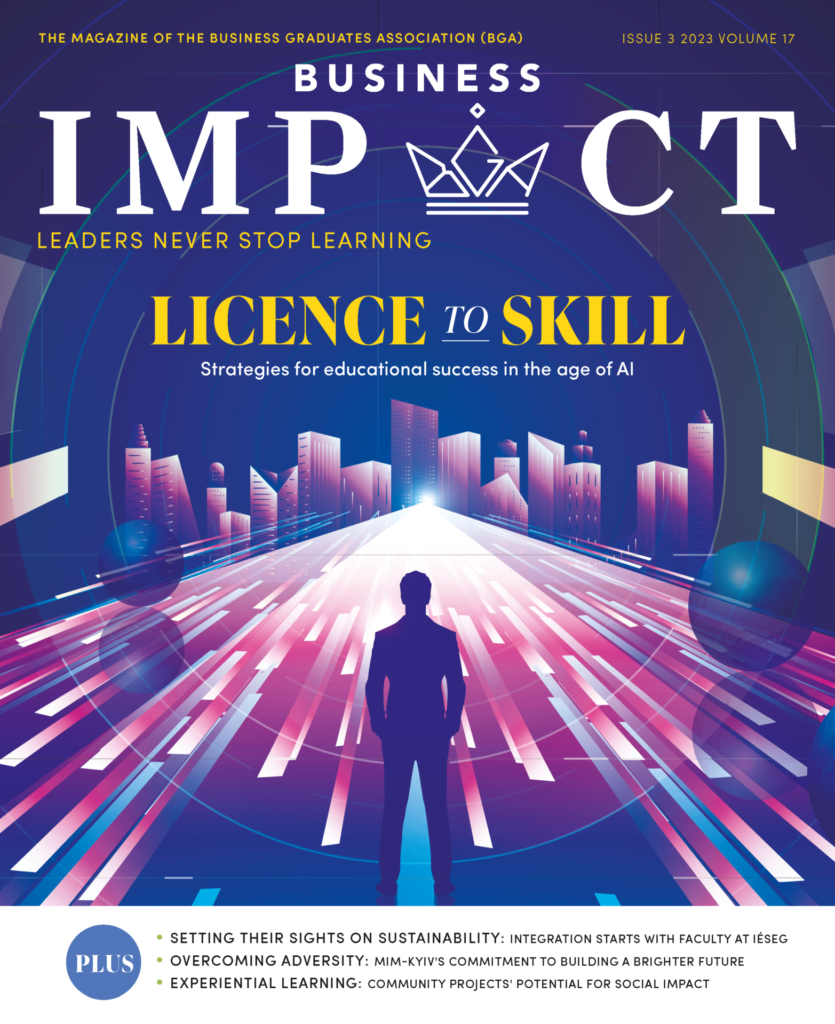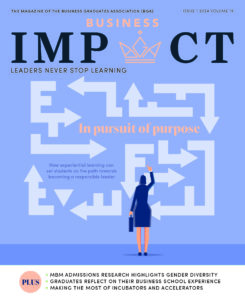Overcoming adversity to serve the business community


Where is MIM Business School Ukraine currently operating and running its programmes from and where are the school’s students working and studying from?
“All this time MIM Business School has been operating in Kyiv. In April 2022, less than two months after the start of the war, we resumed our programmes online for students and launched two new pre-MBA groups. Some students enlisted or joined territorial defence units and suspended their studies, but most decided to continue despite the crisis and the challenges of war.
“In February of the same year, the debris of a missile damaged our building, but it did not take us long to restore everything. That autumn, we resumed in-person MBA classes and in early 2023, we held in-person graduation ceremonies for our MBA and senior executive MBA classes. These were emotional events that brought our close-knit community closer together and demonstrated our resilience. We felt invincible.
“Today, most of our students are in Ukraine, concentrated in the cities of Kyiv, Kharkiv, Dnipro, Poltava or Odesa. We also have students from Mariupol and other cities that are either occupied or in war zones. They are mostly joining online and continue their studies from their new places of residence.
“Even before the pandemic, we had started to implement the HyFlex format so that we could teach students both in the classroom and online. We have all the necessary equipment and create the effect of presence to engage both offline and online students seamlessly in the learning process.”
Can you tell us about your most recent intake of MBA students, their two-year programme of study and their ambitions in a time of conflict?
“The new MBA programme started with 28 students, with 25 more people joining our senior executive MBA programme. Enrolment coincided with the peak of massive missile attacks on Ukraine’s infrastructure and civilian targets. It was very difficult to plan, especially for two years in advance, but our entrepreneurs and managers were interested in these programmes, they were enquiring about the course and were applying.
“The main goal of these participants is to accelerate Ukraine’s economic victory. The business community is working hard in regions free from military actions, paying taxes and volunteering. Moreover, those who have relocated abroad are helping to establish the reputation of Ukraine and Ukrainian business outside the country. These people will become the leaders of our country’s revival. They understand that they need to be ready for the effective reconstruction of their homeland and that this is the best time to acquire and improve their knowledge, skills and competencies.
“We are proud that Taras Chmut, head of respected charity Come Back Alive, joined our 2023 MBA class. This foundation has helped Ukraine’s military for many years and brought its activities to a new level last year. The charity’s founder and Ukraine’s current deputy minister of defence Vitaliy Deynega is also an MBA alumnus of MIM.
“Our MBA programme has been updated, with a curriculum that reflects military realities in Ukraine and global macroeconomic changes. Furthermore, to lay the foundation for the restoration of Ukraine’s economy, we have added an international online component that features leading business schools from across the world and their faculty.”
Why is it important for your school to continue offering programmes during a time of conflict?
“MIM was the first business school in the post-Soviet region to offer an MBA programme. For more than 34 years, our mission has been to consistently create a critical mass of business leaders who are the driving force of Ukraine’s competitiveness in the global economy. In times of crisis, it is even more important to have strong leaders who can run a company or a country successfully under difficult conditions.
“We have always felt a responsibility to contribute towards the development of an independent Ukraine, a country with European values and great potential. At this time, we feel an even greater responsibility to set an example of how the Ukrainian business community can be supported with intellectual resources and a mindset of doing business no matter what.
“A war most often brings with it a fall in the economy and business activities. Business education at such a time helps managers and entrepreneurs understand the complexity of the economic and political challenges they are facing. The labour market is also undergoing significant changes and skilled professionals are becoming increasingly important for companies looking for ways to survive and grow.
“The demand for business education in Ukraine is growing, so we need to adapt quickly. We believe that the more educated businesspeople and managers we have in Ukraine, the faster our country will develop and the more it can offer the world. Already, the war has shown that Ukrainian business can operate in international markets as well as they do at home.
“For example, the logistics company Nova Poshta is opening offices in Poland and the Baltic states. Our graduates are successfully launching businesses in Europe and other countries. High-quality international business education is one of the driving forces of Ukrainian business’ international expansion. We teach business to speak the same language as the rest of the world, so it is extremely important to continue providing quality business education during the war.”
What were the reasons behind the launch of the ReInforceUA initiative?
“ReInforceUA is an international educational project aimed at strengthening Ukraine by bringing the global agenda to our country. Despite the war, Ukraine needs to develop at the same pace as the rest of the world. We need to become more global, know what the world is doing and adopt new ideas to move in the right direction, as well as implement modern technologies.
“Between February and March 2022, international partners, students and graduates started reaching out to us to offer help. We realised that contributions from the world’s leading business schools, outstanding teachers and renowned experts would offer valuable intellectual support for businesspeople, managers, politicians and public figures who are doing their best to strengthen Ukraine’s economy. Last summer, we therefore launched a speaker series where ideas and opinions from leading thinkers are delivered to the Ukrainian business community each week.
“The lectures within ReInforceUA are free, but we collect charity donations. The funds are being used to implement a programme for female entrepreneurs who have been displaced because of the war. The purpose is to provide them with educational support, help them adapt and acquire the necessary knowledge and skills to start and run a business wherever they reside now. I would like to take this opportunity to thank AMBA for its support of the ReInforceUA project.”
What have been the highlights of ReInforceUA so far and what plans do you have for its future?
“One highlight has been the speakers, including professors from business schools and universities, as well as experts such as [UK economist] Guy Standing, [Israeli author] Yuval Noah Harari, [Swiss business theorist] Alex Osterwalder, [Harvard Business School associate] Christian Ketels, [US marketer] Philip Kotler and [outgoing Insead dean] Ilian Mihov. It even featured Charles Camarda, a US astronaut who went into space shortly after friends of his died in the Columbia shuttle disaster to conduct research designed to avoid fatal mistakes in the future. To wrap up the project, we hosted an in‑person forum in Kyiv in October, entitled Facing the Future: ReInforceUA.
“To make this information available to as many Ukrainians as possible, we are also working on a book that will collate lecture materials from the project.”
How did the school come to partner with an MBA alumnus on Raise for Ukraine and what are the aims of this project?
“The Raise for Ukraine (Raise4UA) project is aimed at developing the volunteer community and accelerating and increasing both military and civilian aid. It also provides a platform for international donors and philanthropists that want to help Ukraine.
“Maksym Korolenko, co-owner of the Zagorye travel company and a student on MIM’s senior executive MBA programme began to work on the project in spring 2022. He has since graduated and become a faculty member at MIM.
“Korolenko came up with the idea of bringing together donors with those they want to help. At first, he provided official National Bank of Ukraine accounts specifically for the needs of the armed forces. We then realised that MIM Business School should create a resource of its own to optimise the capabilities of international companies and our own connections, so the MIM team acted as a partner in the creation of the Raise4UA platform. In particular, we collect funds for the programme I mentioned earlier that seeks to support Ukrainian women displaced by the war.
“The Raise4UA platform puts transparency at its centre to help implement charity projects, improve communication and build trust. For example, it uses a CRM system that tracks both the flow of money and communication with benefactors. Any organisation involved in assisting the military or providing humanitarian aid to civilians can also post a fundraising request.”
What other initiatives have been set up by the school in response to the war?
“In the first days of the war, we created MIM Helps, a group chat in the Telegram app that around 500 people have now used to exchange messages relating to requests for, and offers of, support.
“One month after the start of the conflict, in March last year, we launched two online projects. MIM: Economic Front is a series of anti-crisis broadcasts in which experts and managers of leading companies discuss how they are overcoming the difficulties of war, the decisions they make to keep their organisations going, how they take care of their employees and the ways they are seeking to support the country’s economy. This project wasn’t just created to share information, but also to encourage members of our business community to help each other, so we created another group on Telegram where companies can post information, offers and positions.
“Another project is MIM Toolbox. The focus here is on managerial psychology in times of crisis. Our faculty members with experience in coaching and psychology host live streams aimed at providing support and enhancing managers’ resilience to help them cope. Participants can also ask questions during the broadcast and receive an immediate response.”
Do you think that management education has a responsibility to play a leading role in the reconstruction of Ukraine?
“The war’s impact has been devastating, but Ukrainian executives and managers are still going to school. It means they believe in the future of Ukraine. They feel that their individual contribution is important and that the kind of country they and their children will live in rests on their shoulders.
“For this reason, I do believe management education will play a leading role in the restoration of Ukraine. Effective management is critical for any successful business. If Ukrainian managers have strong skills, it will help companies and organisations to become more competitive in the global market and accelerate economic growth. Management education can also help build an effective public sector management system. Leaders in possession of good management and decision-making skillsets will improve the effectiveness of public administration and contribute to the development of the country as a whole.
“In addition, management education promotes a good corporate culture in Ukrainian companies. It also helps embed high ethical standards and corporate social responsibility. This, in turn, will boost the confidence of international partners and investors in Ukrainian business.
“Every time I welcome a new cohort of students, I see people who are eager for new ideas and contacts. They come to study today so that they can create both their own future and the future of Ukraine. That makes me feel stronger and inspires me to continue what we are doing. After all, as I tell all our students, education is always about the future.”
Should business schools around the world do more to include politics and international relations in their programmes?
“Business cannot exist outside politics and our MBA programme discusses the elements of politics that most affect business. Today, we need to act more decisively because business education is not just about enhancing knowledge and expertise, it also shapes the way we see the world. For me, it’s clear that global business schools should incorporate the development of students’ strategic understanding of politics and international relations. Business education must provide students with a wide range of knowledge and skills that will help them manage relations with other countries effectively and understand global issues.”
How is your school planning for the future in a time of such uncertainty?
“Of course, planning during a time of war is a challenge for any business school in Ukraine. We have become experts in resilience and crisis management. We need to be flexible and adaptable, ready for rapid and unpredictable changes. We also need to implement innovations and technologies in a timely manner. For example, we have several secured classrooms with all the necessary equipment. It means that we have everything we need to survive air raids, rocket attacks and power outages.
“It’s also important for us to stay in close contact with the business community. This is relatively easy for us because our 7,500 graduates help us understand the needs of the business community and this means that we can incorporate the latest and most efficient practices into our programmes.
“Lastly, we must continue to expand our collaborations and international partnerships to become more global and ensure a timely, high-quality interaction, as well as an exchange of knowledge and experiences, for all our participants.
“We are confident that management education will play a critical role in the future, so today we need to think about our contribution to the development of the educational management system in Ukraine. Our task is to train a new generation of teachers, develop new programmes and update educational legislation. This system should include the best international practices and experience.”

Iryna Tykhomyrova is the president of MIM Business School, based in Kyiv, Ukraine. Under her leadership, the school – often referred to as MIM-Kyiv – has become a regional educational hub and established itself as a platform for dialogue between business, civil society and government agencies
This article originally appeared in the print edition (Issue 3 2023) of Business Impact, magazine of the Business Graduates Association (BGA)


